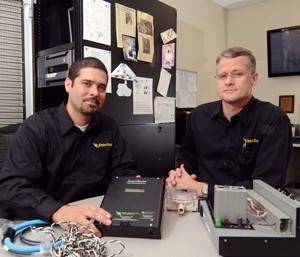
Tracy Lozano, a Clark County REMC consumer, left, and Ed Fancher, a Harrison REMC consumer, are the faces behind EnterScape, a New Albany-based enterprise helping clients improve efficiency.
Home energy audits are an effective way to curb energy use. They bring to light little and large things homeowners can do — like caulk an unnoticed crack or replace an old appliance — to save money.
But what can you do if you’re a commercial or industrial consumer whose electric bill is 100 or even 1,000 times an average homeowner’s and you have multiple buildings or plants across the state, country or world?
Enter EnterScape, a year-old enterprise in New Albany which can provide the data for “industrial-strength” energy audits.
Originally known as Energy Management Solutions, EnterScape offers web-based monitoring services to commercial and industrial clients by using state-of-the-art equipment and proprietary software. The data it collects can be given a cursory dashboard glance, or probed to the nth degree. And the data reflect not just utility use alone. Ed Fancher, EnterScape’s president, noted data can include any relevant factor associated with a facility’s “enterprise landscape,” offering a nod to his company’s rebranded moniker.
“A number of dashboards exist on the market,” he said. “Many are ‘simple’ dashboards. They don’t allow the user to evaluate energy usage against daily production, machine utilization, flow rates, … and then start correlating energy usage to either sales or production data. Our software has been designed to do that.”
Fancher said most dashboards are educational to show a user a problem is present, like the “check engine” light on your car’s dash. “If an anomaly occurs, it’ll be there. You’ll see it. But in an industrial setting, where there’s so much data, it is not easy to do a deep dive to analyze things.”
“We are equivalent to the OBD-II [on-board diagnostic] sensor that you plug into your vehicle,” he added. “If you see an anomaly on your dashboard gauge, at that point you dive in with our software.”
Based in the Purdue Research Park, EnterScape is currently monitoring about 20 locations around the world. Current clients range from electronic manufacturers to large fast food corporations. All the data from each monitored facility is transmitted to EnterScape’s servers via the Internet.
Fancher said he realized the need for EnterScape and its software while working as an engineering consultant with the fast food company a few years ago.
“We saw a need, and there wasn’t really a good solution for analytical energy data reporting systems,” he said. “We began developing our own software and database that would allow a client to transmit data to a central repository through the Internet from multiple locations. And then, from any PC with an Internet connection, be able to generate reports automatically.”
He said with EnterScape’s software, a client’s engineers or EnterScape, for example, can crosscheck a potential worrisome spike in energy use with the plant’s output. “That particular day, if you had twice the output, twice the revenue, is that really a problem? You look at utility usage relative to factory output or process speed. That’s where we’ve taken a slightly different approach than some of the other energy monitoring companies.”
Bob Geswein, the energy advisor for Harrison REMC, noted EnterScape takes the data and puts it into concise, usable reports. He explained industrial consumers get charged not just for the kilowatt-hours they use, but for the size of their peak demand at any given time. “Demand charge can be half the bill for a commercial/industrial customer,” he said. “It behooves companies to consider retrieving data to enable them to analyze the demand component of their electric bill.”
Right now, Geswein said the analysis EnterScape provides is much more than the average residential consumer could ever use and its cost wouldn’t justify any potential savings. But he sees carry-overs that could some day benefit residential consumers, as well, that will go beyond the advanced metering many electric co-ops are already installing.
“It’s operations like this,” Geswein said, “which are going to perfect this technology …, and then one day, there will be an inexpensive control that allows them to do a similar thing for residential. Ed’s here with the concept. We’re just not there yet with smaller, inexpensive equipment for the residential market.”
“There are a lot of companies developing solutions for energy management,” added Fancher. “It is a quickly evolving field.”



